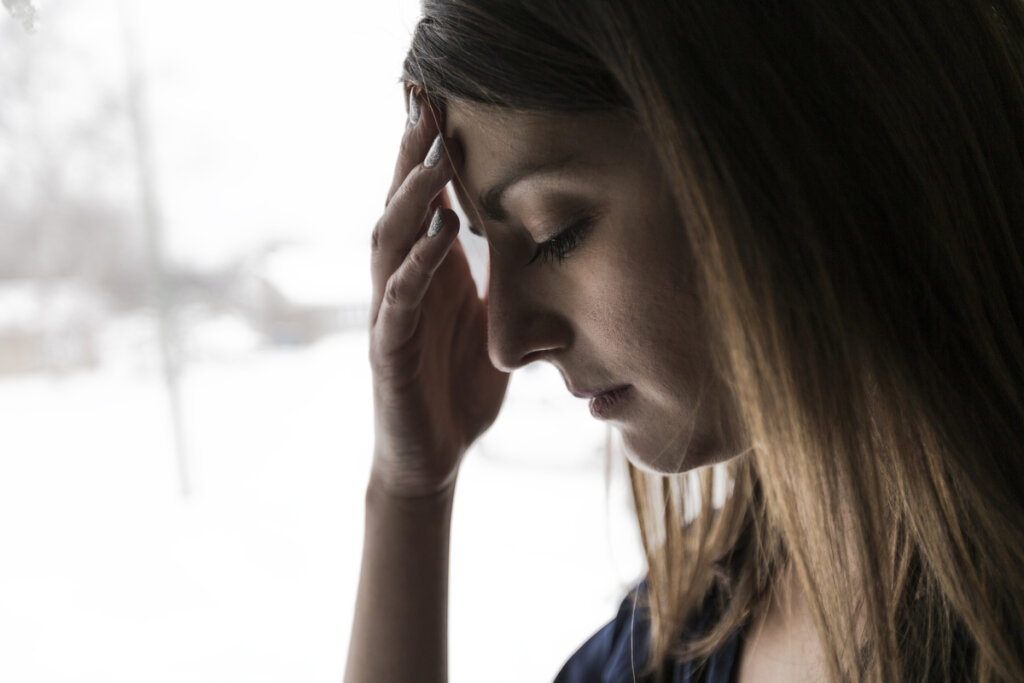What to Do if You Have an Anxiety Attack

Have you ever had an anxiety attack and didn’t really know how to handle it? Anxiety attacks, also known as anxiety, panic, or panic attacks, are episodes of fear, anxiety, or intense discomfort that cause a series of physical and psychological symptoms. These include palpitations, breathing difficulties, fear of losing control or going crazy or even dying.
In this article, we offer you some ideas on what to do if you suffer an anxiety attack. It’s important to try and stay calm, find a safe place, and, above all, to focus on your breathing (or an external object, to decentralize your attention).
Anxiety attacks
An anxiety attack is defined in the DSM-5 as the sudden appearance of intense fear/discomfort that reaches its maximum expression in minutes. During this time, four (or more) symptoms occur. These include palpitations, sweating, tremors or shaking, feelings of suffocation, chest pain or discomfort, etc.
Antonio Cano Vindel is a Professor of Psychology at the Complutense University of Madrid and president of the Spanish Society for the Study of Anxiety and Stress. He states that anxiety attacks are ‘ extreme emotional reactions of alarm that produce fear’.
This type of crisis is related to moments of stress or traumatic events. However, not all anxiety attacks are triggered by an identifiable cause. In other words, they can arise in times of calm as well as stress.

What to do if you have an anxiety attack
Keep in mind that an anxiety attack will, sooner or later disappear. However, in the meantime, you can take small actions so that the fear and anguish you feel are reduced and disappear sooner.
Keep in mind that the initial goal is to get you to stop thinking about your symptoms. Therefore, try to breathe slowly and focus your attention on elements other than your symptoms and thoughts.
1. Breathe calmly
At this point, you don’t have to breathe very deeply. You just need to control your breathing. This process is usually automatic. However, what you’re doing is regulating it in a way that’s opposite to how it would be automatically regulated in the face of a real threat.
You can try the following: Inhale the air for two or three seconds. Hold it for two or three more and exhale progressively. You’ll soon see how repeating this exercise allows you to control your breathing. Consequently, it gradually reduces your symptoms of anxiety.
“Feelings come and go, like clouds in a windy sky. Conscious breathing is my anchor.”
-Thich Nhat Hanh-
2. Find a safe and quiet place
Something else to do if you have an anxiety attack is to find a safe and quiet place, where you can’t hurt yourself.
Sit down if you consider it necessary. Try to gain a sense of calm. If you think you’ll feel more secure if you call someone, then go ahead.
3. Try to stay calm
It’s clear that staying calm during an anxiety attack is no easy task. However, you don’t have to set out to be exceptionally calm.
Just keep breathing calmly and don’t feed any negative thoughts. Simply focus on your breathing.
4. Focus on non-internal elements
To stop focusing your attention on the symptoms of the anxiety attack, it’s a good idea to concentrate on something from the outside. It could be anything, people walking by, a tree, a bench, the window…
Just look at that object and keep breathing. Alternatively, you can just focus on your breathing.
5. Don’t magnify the symptoms
You often think of an anxiety attack as something that can harm you. Therefore, before one, you tend to develop catastrophic thoughts or even thoughts of dying from the attack. However, the truth is that you can’t die from an anxiety attack.
Therefore, try not to magnify the symptoms. Just think of them as the same kinds of feelings you’d experience, for example, in an exam or before speaking in public.
Although you experience them as extremely intense, the truth is that the symptoms aren’t dangerous by themselves. Above all, remember that the attack will disappear sooner or later.
6. Normalize the situation
According to experts, during the onset of the anxiety attack, many people fear that the symptoms are observable by others. Therefore, they try to normalize the situation. Whether you’re being observed or not, try and find a safe and quiet place if you’re feeling too exposed.
Keep in mind that normalizing the situation doesn’t mean downplaying or invalidating your symptoms. On the contrary, it’s clear that in an anxiety attack you suffer a lot. However, relativizing the situation can help you when you’re experiencing one.

If you ever experience an anxiety attack, try using the guidelines we’ve mentioned above. The most important thing is that you remain clear that a panic or anxiety attack isn’t something dangerous, even though it’s very distressing.
Above all, remember that it’s important to seek professional help to identify the possible causes of these attacks and prevent them. Especially if you find you’re experiencing repeated attacks over a prolonged period of time.
Have you ever had an anxiety attack and didn’t really know how to handle it? Anxiety attacks, also known as anxiety, panic, or panic attacks, are episodes of fear, anxiety, or intense discomfort that cause a series of physical and psychological symptoms. These include palpitations, breathing difficulties, fear of losing control or going crazy or even dying.
In this article, we offer you some ideas on what to do if you suffer an anxiety attack. It’s important to try and stay calm, find a safe place, and, above all, to focus on your breathing (or an external object, to decentralize your attention).
Anxiety attacks
An anxiety attack is defined in the DSM-5 as the sudden appearance of intense fear/discomfort that reaches its maximum expression in minutes. During this time, four (or more) symptoms occur. These include palpitations, sweating, tremors or shaking, feelings of suffocation, chest pain or discomfort, etc.
Antonio Cano Vindel is a Professor of Psychology at the Complutense University of Madrid and president of the Spanish Society for the Study of Anxiety and Stress. He states that anxiety attacks are ‘ extreme emotional reactions of alarm that produce fear’.
This type of crisis is related to moments of stress or traumatic events. However, not all anxiety attacks are triggered by an identifiable cause. In other words, they can arise in times of calm as well as stress.

What to do if you have an anxiety attack
Keep in mind that an anxiety attack will, sooner or later disappear. However, in the meantime, you can take small actions so that the fear and anguish you feel are reduced and disappear sooner.
Keep in mind that the initial goal is to get you to stop thinking about your symptoms. Therefore, try to breathe slowly and focus your attention on elements other than your symptoms and thoughts.
1. Breathe calmly
At this point, you don’t have to breathe very deeply. You just need to control your breathing. This process is usually automatic. However, what you’re doing is regulating it in a way that’s opposite to how it would be automatically regulated in the face of a real threat.
You can try the following: Inhale the air for two or three seconds. Hold it for two or three more and exhale progressively. You’ll soon see how repeating this exercise allows you to control your breathing. Consequently, it gradually reduces your symptoms of anxiety.
“Feelings come and go, like clouds in a windy sky. Conscious breathing is my anchor.”
-Thich Nhat Hanh-
2. Find a safe and quiet place
Something else to do if you have an anxiety attack is to find a safe and quiet place, where you can’t hurt yourself.
Sit down if you consider it necessary. Try to gain a sense of calm. If you think you’ll feel more secure if you call someone, then go ahead.
3. Try to stay calm
It’s clear that staying calm during an anxiety attack is no easy task. However, you don’t have to set out to be exceptionally calm.
Just keep breathing calmly and don’t feed any negative thoughts. Simply focus on your breathing.
4. Focus on non-internal elements
To stop focusing your attention on the symptoms of the anxiety attack, it’s a good idea to concentrate on something from the outside. It could be anything, people walking by, a tree, a bench, the window…
Just look at that object and keep breathing. Alternatively, you can just focus on your breathing.
5. Don’t magnify the symptoms
You often think of an anxiety attack as something that can harm you. Therefore, before one, you tend to develop catastrophic thoughts or even thoughts of dying from the attack. However, the truth is that you can’t die from an anxiety attack.
Therefore, try not to magnify the symptoms. Just think of them as the same kinds of feelings you’d experience, for example, in an exam or before speaking in public.
Although you experience them as extremely intense, the truth is that the symptoms aren’t dangerous by themselves. Above all, remember that the attack will disappear sooner or later.
6. Normalize the situation
According to experts, during the onset of the anxiety attack, many people fear that the symptoms are observable by others. Therefore, they try to normalize the situation. Whether you’re being observed or not, try and find a safe and quiet place if you’re feeling too exposed.
Keep in mind that normalizing the situation doesn’t mean downplaying or invalidating your symptoms. On the contrary, it’s clear that in an anxiety attack you suffer a lot. However, relativizing the situation can help you when you’re experiencing one.

If you ever experience an anxiety attack, try using the guidelines we’ve mentioned above. The most important thing is that you remain clear that a panic or anxiety attack isn’t something dangerous, even though it’s very distressing.
Above all, remember that it’s important to seek professional help to identify the possible causes of these attacks and prevent them. Especially if you find you’re experiencing repeated attacks over a prolonged period of time.
All cited sources were thoroughly reviewed by our team to ensure their quality, reliability, currency, and validity. The bibliography of this article was considered reliable and of academic or scientific accuracy.
- Caballo (2002). Manual para el tratamiento cognitivo-conductual de los trastornos psicológicos. Vol. 1 y 2. Madrid. Siglo XXI.
- Fullana, M. A. et al. (2011). Prevalence and correlates of respiratory and non-respiratory panic attacks in the general population. Journal of Affective Disorders, 131(1-3): 330-338.
- García-Grau, E. et al. (2008). Manual de entrenamiento en respiración. Universitat de Barcelona: Facultat de Psicologia, Departament de Personalitat, Avaluació i Tractament Psicològics.
- Pérez, M., Fernández, J.R., Fernández, C. y Amigo, I. (2010). Guía de tratamientos psicológicos eficaces I y II. Madrid: Pirámide.
This text is provided for informational purposes only and does not replace consultation with a professional. If in doubt, consult your specialist.







